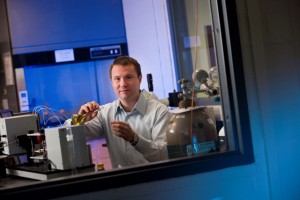
James Ferri, associate professor and head of chemical engineering
James Ferri has always understood how a well-rounded education fits in with the study of engineering.
When he started college at Johns Hopkins University, he began studying business and then considered pursuing a career in medicine. But realizing how much he enjoyed his organic chemistry class, he decided on pursuing chemical engineering and has built a career on the cutting edge of the field.
Ferri, associate professor and head of chemical and biomolecular engineering, became so taken with the field that he stayed at Johns Hopkins to complete his Ph.D. He still stays well-rounded, delving into areas such as medicine, environmental engineering, biology, and nanotechnology through his research. His expertise is in interfacial and colloidal phenomena.
The colloidal domain is comprised of tiny particles measured in nanometers and microns. In contrast, interfacial phenomena have a surface-to-volume ratio that is very large. While at first glance, his research seems very academic, it has broad real-world applications. For instance, engineers are heavily involved in controlled drug delivery. Ferri points to chemotherapy drugs as a prime example.
“The spatial distribution of a drug refers to where the drug is in the body,” he explains. “Chemotherapeutic agents are highly toxic, and therefore it’s advantageous to target their delivery to only regions where there is cancer.”
Helping students understand such complex concepts is a passion for Ferri, and he isn’t satisfied simply to gloss over topics. Not only does this help students understand the subject, it helps them become better engineers overall.
“My approach is designed to teach students how to think,” he says. “I really want my students to understand what they are talking about, which tends to force better thinking and in engineering. That’s critical. I enjoy helping them expand their understanding of the physical world and extend their basic knowledge of physical principles to the solution of practical problems. An engineering education enables students to make rational decisions and designs by consistent application of fundamental principles.”
Ferri also helps students expand their horizons outside the classroom. He led the new study abroad program in Spain, taking a group of 25 engineering students to St. Louis University’s Madrid campus last spring. Experiences like this are pivotal moments for undergraduates.
“It’s fun to see other parts of the world for me and for my students. It’s also great to realize that there is a common language of science and technology that transcends language and culture,” he says. “When engineering students study abroad, it is much easier to understand the generalities of the physical world.”
Ferri has worked extensively with students on a one-on-one basis through independent studies and honors projects, as well as including them in his own research as part of National Science Foundation (NSF)-funded research and the College’s EXCEL Scholars program. Many of his students have presented their research at national and international conferences and have received national honors such as the Morris K. Udall Scholarship, the NSF Graduate Research Fellowship, and the Tau Beta Pi engineering honor society fellowship. In 2008, he received the Thomas Roy and Lura Forrest Jones Lecture Award from Lafayette.
Most recently, Ferri partnered with former student and current colleague Lauren Sefcik ’04, assistant professor of chemical and biomolecular engineering, to secure a $357,106 Major Research Instrumentation grant from the NSF. He has received or helped secure three previous NSF grants totaling more than $550,000. He has been a visiting scientist at Northwestern University in the Department of Materials Science and Engineering, as well as Alexander von Humboldt Fellow at the Max Planck Institute for Colloids and Interfaces in Potsdam, Germany.
